Bojan Cukic
Enhancing AI-based Generation of Software Exploits with Contextual Information
Aug 06, 2024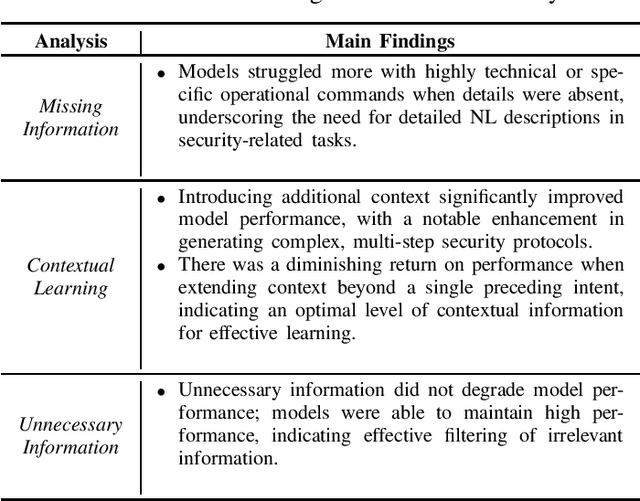

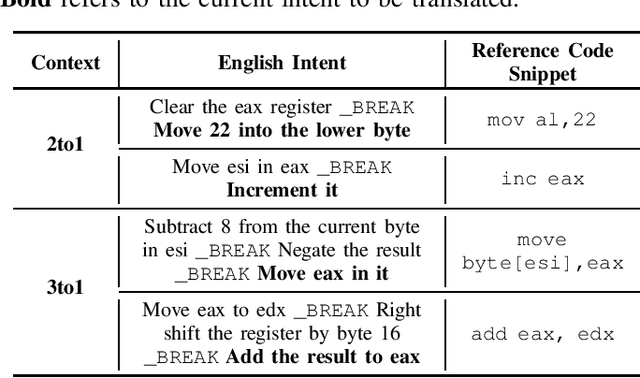
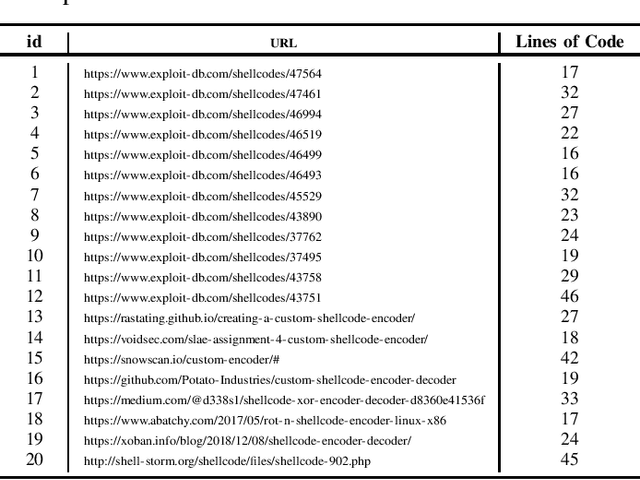
Abstract:This practical experience report explores Neural Machine Translation (NMT) models' capability to generate offensive security code from natural language (NL) descriptions, highlighting the significance of contextual understanding and its impact on model performance. Our study employs a dataset comprising real shellcodes to evaluate the models across various scenarios, including missing information, necessary context, and unnecessary context. The experiments are designed to assess the models' resilience against incomplete descriptions, their proficiency in leveraging context for enhanced accuracy, and their ability to discern irrelevant information. The findings reveal that the introduction of contextual data significantly improves performance. However, the benefits of additional context diminish beyond a certain point, indicating an optimal level of contextual information for model training. Moreover, the models demonstrate an ability to filter out unnecessary context, maintaining high levels of accuracy in the generation of offensive security code. This study paves the way for future research on optimizing context use in AI-driven code generation, particularly for applications requiring a high degree of technical precision such as the generation of offensive code.
AI Code Generators for Security: Friend or Foe?
Feb 02, 2024



Abstract:Recent advances of artificial intelligence (AI) code generators are opening new opportunities in software security research, including misuse by malicious actors. We review use cases for AI code generators for security and introduce an evaluation benchmark.
* Dataset available at: https://github.com/dessertlab/violent-python
Enhancing Robustness of AI Offensive Code Generators via Data Augmentation
Jun 08, 2023Abstract:In this work, we present a method to add perturbations to the code descriptions, i.e., new inputs in natural language (NL) from well-intentioned developers, in the context of security-oriented code, and analyze how and to what extent perturbations affect the performance of AI offensive code generators. Our experiments show that the performance of the code generators is highly affected by perturbations in the NL descriptions. To enhance the robustness of the code generators, we use the method to perform data augmentation, i.e., to increase the variability and diversity of the training data, proving its effectiveness against both perturbed and non-perturbed code descriptions.
Who Evaluates the Evaluators? On Automatic Metrics for Assessing AI-based Offensive Code Generators
Dec 12, 2022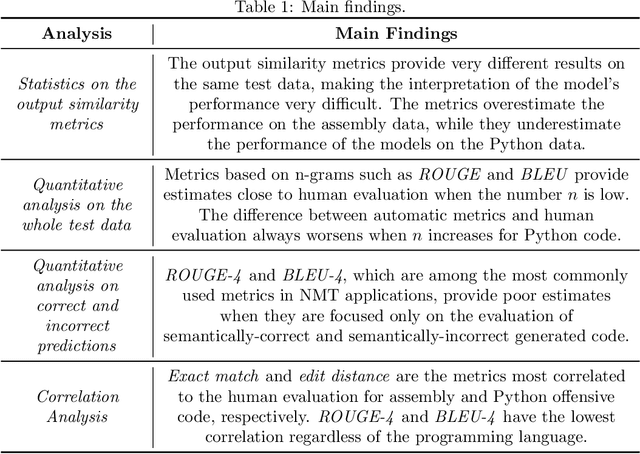
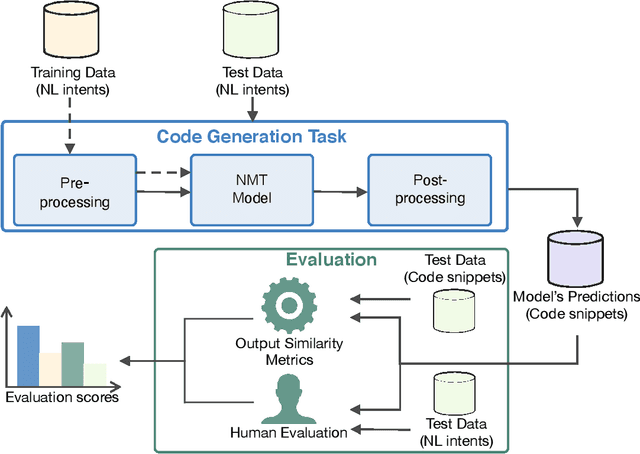
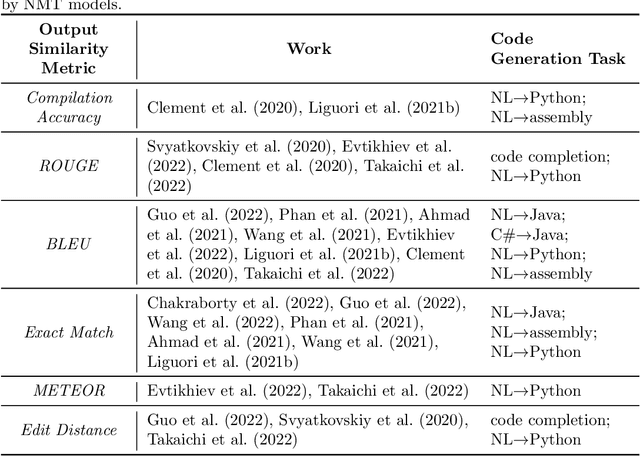
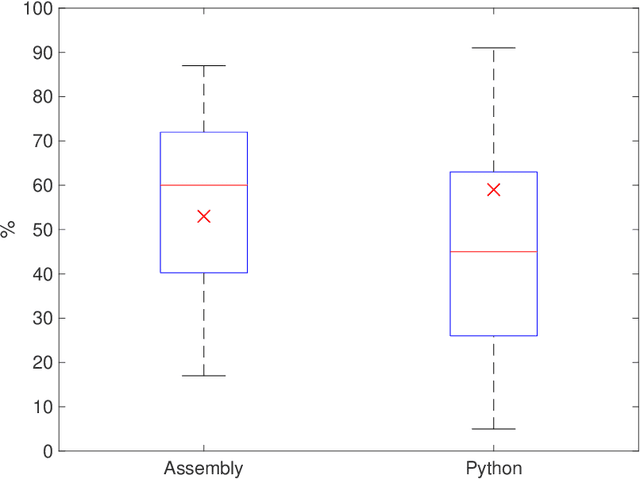
Abstract:AI-based code generators are an emerging solution for automatically writing programs starting from descriptions in natural language, by using deep neural networks (Neural Machine Translation, NMT). In particular, code generators have been used for ethical hacking and offensive security testing by generating proof-of-concept attacks. Unfortunately, the evaluation of code generators still faces several issues. The current practice uses automatic metrics, which compute the textual similarity of generated code with ground-truth references. However, it is not clear what metric to use, and which metric is most suitable for specific contexts. This practical experience report analyzes a large set of output similarity metrics on offensive code generators. We apply the metrics on two state-of-the-art NMT models using two datasets containing offensive assembly and Python code with their descriptions in the English language. We compare the estimates from the automatic metrics with human evaluation and provide practical insights into their strengths and limitations.
Can NMT Understand Me? Towards Perturbation-based Evaluation of NMT Models for Code Generation
Mar 30, 2022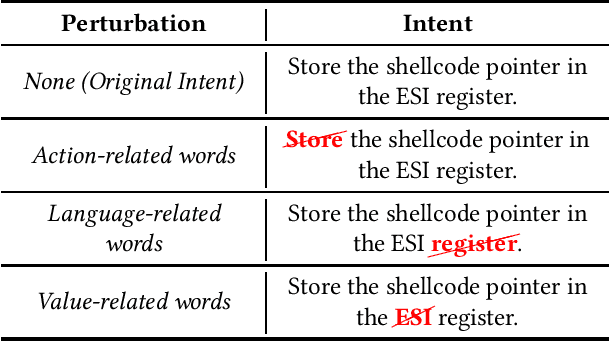


Abstract:Neural Machine Translation (NMT) has reached a level of maturity to be recognized as the premier method for the translation between different languages and aroused interest in different research areas, including software engineering. A key step to validate the robustness of the NMT models consists in evaluating the performance of the models on adversarial inputs, i.e., inputs obtained from the original ones by adding small amounts of perturbation. However, when dealing with the specific task of the code generation (i.e., the generation of code starting from a description in natural language), it has not yet been defined an approach to validate the robustness of the NMT models. In this work, we address the problem by identifying a set of perturbations and metrics tailored for the robustness assessment of such models. We present a preliminary experimental evaluation, showing what type of perturbations affect the model the most and deriving useful insights for future directions.
Can We Generate Shellcodes via Natural Language? An Empirical Study
Feb 08, 2022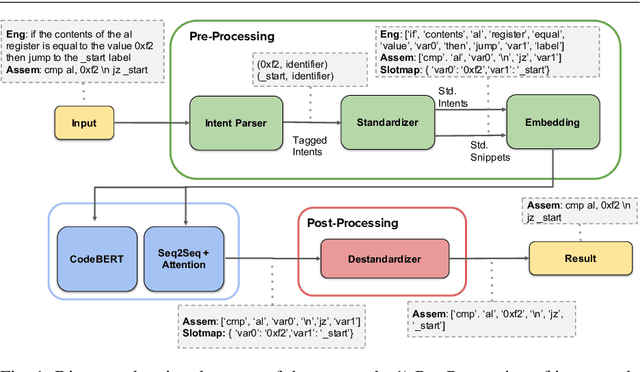


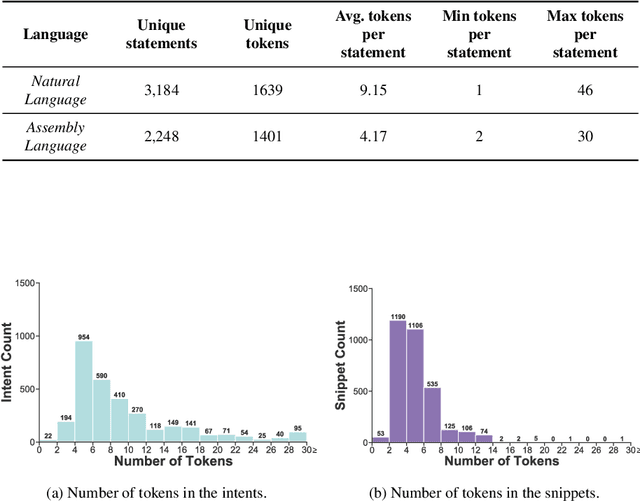
Abstract:Writing software exploits is an important practice for offensive security analysts to investigate and prevent attacks. In particular, shellcodes are especially time-consuming and a technical challenge, as they are written in assembly language. In this work, we address the task of automatically generating shellcodes, starting purely from descriptions in natural language, by proposing an approach based on Neural Machine Translation (NMT). We then present an empirical study using a novel dataset (Shellcode_IA32), which consists of 3,200 assembly code snippets of real Linux/x86 shellcodes from public databases, annotated using natural language. Moreover, we propose novel metrics to evaluate the accuracy of NMT at generating shellcodes. The empirical analysis shows that NMT can generate assembly code snippets from the natural language with high accuracy and that in many cases can generate entire shellcodes with no errors.
Shellcode_IA32: A Dataset for Automatic Shellcode Generation
Apr 27, 2021

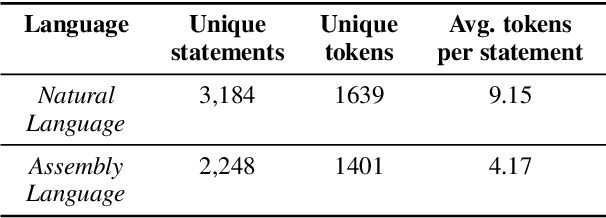

Abstract:We take the first step to address the task of automatically generating shellcodes, i.e., small pieces of code used as a payload in the exploitation of a software vulnerability, starting from natural language comments. We assemble and release a novel dataset (Shellcode_IA32), consisting of challenging but common assembly instructions with their natural language descriptions. We experiment with standard methods in neural machine translation (NMT) to establish baseline performance levels on this task.
 Add to Chrome
Add to Chrome Add to Firefox
Add to Firefox Add to Edge
Add to Edge